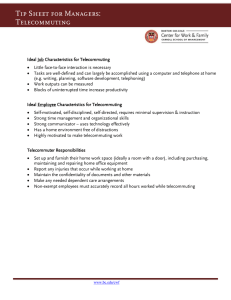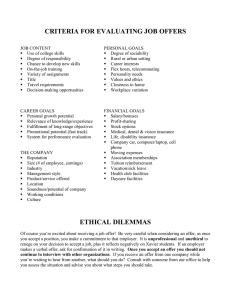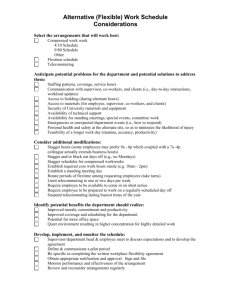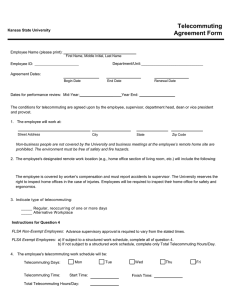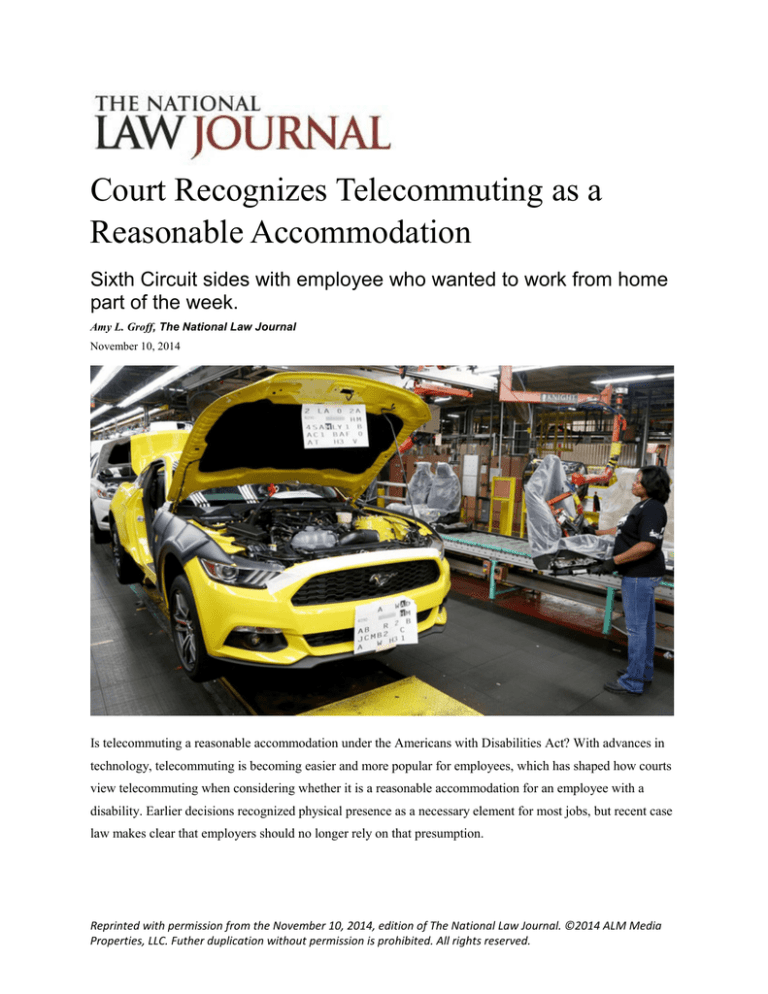
Court Recognizes Telecommuting as a
Reasonable Accommodation
Sixth Circuit sides with employee who wanted to work from home
part of the week.
Amy L. Groff, The National Law Journal
November 10, 2014
Is telecommuting a reasonable accommodation under the Americans with Disabilities Act? With advances in
technology, telecommuting is becoming easier and more popular for employees, which has shaped how courts
view telecommuting when considering whether it is a reasonable accommodation for an employee with a
disability. Earlier decisions recognized physical presence as a necessary element for most jobs, but recent case
law makes clear that employers should no longer rely on that presumption.
Reprinted with permission from the November 10, 2014, edition of The National Law Journal. ©2014 ALM Media
Properties, LLC. Futher duplication without permission is prohibited. All rights reserved.
Telecommuting, which can include working from home and various other remote-workplace arrangements,
should not be overlooked as an accommodation that, in some circumstances, could be required under the ADA.
This article explores developments in this changing area of law, as highlighted by a recent decision by the U.S.
Court of Appeals for the Sixth Circuit, and will outline some factors to consider when deciding whether to
allow employees to telecommute.
In April, the Sixth Circuit's decision in U.S. Equal Employment Opportunity Commission v. Ford Motor
Co. brought increased attention to telecommuting as a potential accommodation. In Ford Motor, the court
reversed the district court's grant of summary judgment to the employer on an ADA failure-to-accommodate
claim involving an employee's request to work from home. However, in August, the court granted rehearing en
banc, and the en banc decision is pending.
The employee in Ford Motor worked as a resale steel buyer, and she suffered from debilitating irritable bowel
syndrome. It was not disputed that her condition was a disability within the meaning of the ADA. As an
accommodation, she sought to work from home up to four days a week. Ford rejected that proposed
accommodation because her position involved team work and client interaction that it believed required faceto-face meetings.
Specifically, as a resale steel buyer, the employee served as an intermediary between steel suppliers and the
companies that used steel to produce parts for Ford, and she had to respond to emergency supply problems and
interact with members of the retail team, suppliers and others in the Ford system. Thus, Ford's argument was
that physical presence in the workplace was an essential function for her position and that, because she was
unable to be present, she was not "qualified" for the position. Ford also argued that the proposed
telecommuting accommodation was unreasonable because, in its business judgment, the required meetings
were best handled face-to-face, and email or teleconferencing were insufficient substitutes for in-person
problem solving.
A Sixth Circuit panel disagreed with Ford. In a 2-1 decision, the court held there was a genuine question of
material fact as to whether the employee could perform her job duties from a remote location. That conclusion
was in sharp contrast to case law from the 1990s finding that it was an unusual case when an employee could
effectively perform all work duties at home and when telecommuting would, thus, be a reasonable
accommodation. Recognizing its divergence from earlier case law, the Sixth Circuit explained that the world
has changed since the foundational opinions addressing physical presence in the workplace and that
teleconferencing technologies are now commonplace.
Another consideration in the case was the existence of a telecommuting policy at Ford. That policy allowed all
salaried employees to apply for a telecommuting arrangement, although it specified that such arrangements
were not appropriate for all jobs, employees, work environments or managers. The EEOC pointed to the policy
and the fact that Ford had allowed resale buyers in other situations to telecommute as support for its position
that this employee's requested accommodation was reasonable.
UNINTENDED CONSEQUENCES
Judge David McKeague's dissenting opinion pointed out that such reasoning and the majority's opinion would
have the unintended consequence of causing employers to tighten their telecommuting policies, to the
detriment of many other employees who benefitted from those policies. In his words, "the lesson for
companies from this case is that, if you have a telecommuting policy, you have to let every employee use it to
its full extent, even under unequal circumstances, even when it harms your business operations, because if you
fail to do so, you could be in violation of the law."
It will be interesting to see how the Sixth Circuit en banc addresses this policy argument. When the EEOC
published final regulations implementing the ADA Amendments Act in 2011, the preamble touched on
telecommuting. In describing the benefits of accommodations attributable to the statute and regulation, the
preamble noted that flexible work arrangements, such as flexible scheduling and telecommuting, can reduce
absenteeism, lower turnover, improve the health of workers and increase productivity.
Another interesting issue for the en banc court will be the question of how much deference to give the
employer's business judgment that in-person interaction is an essential function of the employee's position. The
district court expressly declined to "second-guess" the employer's business judgment regarding the essential
functions of the job, but the Sixth Circuit took a more critical look at whether the interaction really had to be in
person given the communication technology available today.
Under existing regulations, the business judgment of an employer is a factor to be considered in determining
whether an aspect of a job, such as presence at a fixed worksite or some other duty, is an essential function.
Other considerations include the written job description, the amount of time spent performing the function, the
consequences of not requiring the employee to perform the function, the collective bargaining agreement (if
any) and the work experience of other employees in the same or similar positions. 29 C.F.R. 1603.2(n)(2). The
extent to which the en banc court relies on the employer's business judgment regarding essential functions
could have significant ramifications in the context of telecommuting requests — and for other accommodation
requests, as well.
In the meantime, what is clear is that employers will not be granted unfettered discretion to designate certain
functions as essential and that there is no one-size-fits-all solution for most businesses when it comes to
telecommuting requests. In an informal discussion letter released earlier this year, the EEOC criticized
language in a sample policy stating that "working from home is 'generally' not a reasonable accommodation
'except in extraordinary circumstances.'" The EEOC's letter cautioned that the law is far from settled in this
area and that policies suggesting that telecommuting is required only under extraordinary circumstances may
lead an employer to violate the ADA.
On the other hand, the EEOC has acknowledged — in its informal discussion letter and in other written
guidance — that telecommuting is not appropriate for all jobs and that an employer may select another
effective accommodation when one is available. Thus, employers may be able to resolve certain
telecommuting requests by providing a different type of accommodation that likewise accommodates the
employee's condition and allows her to perform the job at the worksite.
In light of the expanded definition of "disability" under the ADA Amendments Act of 2008, more employees
are covered by the statute, making the question of telecommuting as a reasonable accommodation a question
employers will face more frequently than in past decades. And with any remote-workplace arrangement,
employers may have additional issues to consider, such as data security, potential workers' compensation
liability for injuries sustained while working at home, supervision and control of the work performed and
proper tracking of compensable time for nonexempt employees who are subject to overtime and recordkeeping requirements.
It may be possible for employers to argue that unique burdens associated with some of these remote-workplace
issues impose an "undue burden" on their business such that a telecommuting accommodation is not
reasonable. An example involving data security is a government employee whose job could only be performed
at a secure clearance center, for which the U.S. Court of Appeals for the Federal Circuit upheld the denial of a
telecommuting request in 2010. However, apart from jobs like that — or food servers, retail clerks, truck
drivers and other jobs that clearly cannot be performed at home — there is a vast gray area in which employers
may need to consider whether telecommuting would be a reasonable accommodation required by the ADA. As
technology advances, and as courts continue to address changes in technology, this will certainly be an area of
law to watch.
Amy L. Groff is a partner in the Harrisburg, Pa., office of K&L Gates. Her practice involves employment law,
general civil and commercial litigation, and appellate work.

